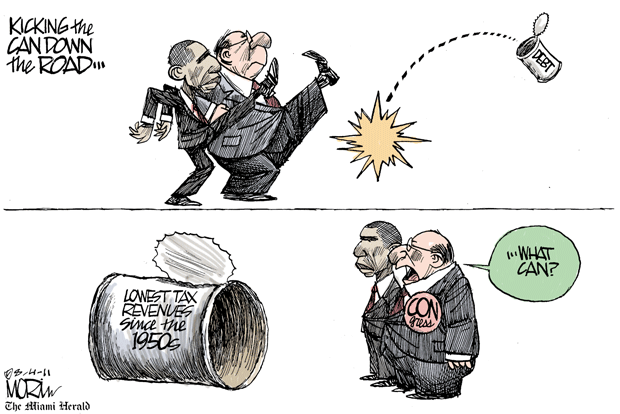“Punting the Pundits” is an Open Thread. It is a selection of editorials and opinions from around the news medium and the internet blogs. The intent is to provide a forum for your reactions and opinions, not just to the opinions presented, but to what ever you find important.
Thanks to ek hornbeck, click on the link and you can access all the past “Punting the Pundits”.
Wednesday is Ladies’ Day
Naomi Klein: Daylight Robbery, Meet Nighttime Robbery
I keep hearing comparisons between the London riots and riots in other European cities-window smashing in Athens or car bonfires in Paris. And there are parallels, to be sure: a spark set by police violence, a generation that feels forgotten.
But those events were marked by mass destruction; the looting was minor. There have, however, been other mass lootings in recent years, and perhaps we should talk about them too. There was Baghdad in the aftermath of the US invasion-a frenzy of arson and looting that emptied libraries and museums. The factories got hit too. In 2004 I visited one that used to make refrigerators. Its workers had stripped it of everything valuable, then torched it so thoroughly that the warehouse was a sculpture of buckled sheet metal.
Back then the people on cable news thought looting was highly political. They said this is what happens when a regime has no legitimacy in the eyes of the people. After watching for so long as Saddam and his sons helped themselves to whatever and whomever they wanted, many regular Iraqis felt they had earned the right to take a few things for themselves. But London isn’t Baghdad, and British Prime Minister David Cameron is hardly Saddam, so surely there is nothing to learn there.
Katrina vander Heuvel: The real grand bargain Washington should seek
“Pressure’s on for the deficit panel,” read a headline in The Post. President Obama urges legislators to pit country over party. An establishment chorus calls for courage to take on Socuial Security and Medicare and to find more revenue. The downgrading of U.S. debt by Standard & Poor’s; the stock market’s spasms; polls showing growing disgust of Americans with politicians of all stripes – all are invoked to push the 12 legislators on the “supercommittee” to reach agreement on another $2.2 trillion in deficit reduction by Nov. 23, when they are due to report.
Amid the din, House Minority Leader Nancy Pelosi actually spoke some common sense in public, something that, if not quite extinct in today’s Washington, is certainly endangered. Naming her three picks to the committee last week, Pelosi urged the group to focus on “economic growth and job creation,” suggesting that its members should “make decisions regarding investments, cuts and revenues and their timing to stimulate growth, while reducing the deficit.”
“We’re dismayed at the injustice that nearly half of all Americans don’t even pay any income tax.”
-Texas Gov. Rick Perry, presidential announcement speech, Aug. 13, 2011.
Washingotn – Really? Of all the ills in the world, of all the problems with the economy, all the difficulties with the tax code, this is the one that Perry chooses to lament?
Perry’s statement conjures visions of America as Slacker Nation, where the overburdened wagon-pullers drag an increasingly heavy burden of freeloaders. His number is correct but, like other conservatives who have seized on the statistic, Perry draws from it a dangerously misleading lesson.
The nonpartisan Tax Policy Center estimates that 46.4 percent of households will owe no federal income tax in 2011. This is, for the most part, not because people have chosen to loaf. It’s because they are working but simply don’t earn enough to owe income taxes, based on the progressive structure of the tax code and provisions designed to help the working poor and lower-income seniors.
Amy Goodman: San Francisco Bay Area’s BART Pulls a Mubarak
What does the police killing of a homeless man in San Francisco have to do with the Arab Spring uprisings from Tunisia to Syria? The attempt to suppress the protests that followed. In our digitally networked world, the ability to communicate is increasingly viewed as a basic right. Open communication fuels revolutions-it can take down dictators. When governments fear the power of their people, they repress, intimidate and try to silence them, whether in Tahrir Square or downtown San Francisco.
snip
Expect hacktivist groups to support revolutions abroad, but also to assist protest movements here at home. In retaliation for BART’s cellphone shutdown, a decentralized hacker collective called Anonymous shut down BART’s website. In a controversial move, Anonymous also released the information of more than 2,000 BART passengers, to expose the shoddy computer security standards maintained by BART.
The BART police say the FBI is investigating Anonymous’ attack. I interviewed an Anonymous member who calls himself “Commander X” on the “Democracy Now!” news hour. His voice disguised to protect his anonymity, he told me over the phone: “We’re filled with indignation, when a little organization like BART … kills innocent people, two or three of them in the last few years, and then has the nerve to also cut off the cellphone service and act exactly like a dictator in the Mideast. How dare they do this in the United States of America.”
Kristina Kallas and Akila Radhakrishnan: Why Is the U.S. Waging War on Women Raped in War?
Mandatory sonograms, forced lectures by doctors, humiliating permission slips from abusive husbands, paternalistic opinions from Supreme Court Justice Kennedy, uneducated and patently stupid soundbites from Tea Partiers. That’s not the worst. In this newest wave of the war on women, let’s not forget the U.S. government’s abortion policies toward women in war.
Rape is systematically being used as a weapon of war in conflicts worldwide. During the Rwandan genocide it is estimated that between 250,000 and 500,000 women were raped in 100 days and that approximately 20,000 children were born as a result of rape. Recent reports from Burma indicate that Burmese soldiers have orders to rape women. 387 civilians were raped in Walikale, North Kivu in the Democratic Republic of Congo (DRC) in a 4 day period last year. In 2008 alone, the U.N. Population Fund recorded 16,000 cases of rape in DRC, two-thirds of them adolescent girls and other children, in an area where rape is vastly underreported. Imagine what the real numbers are.
Mary Bottari: ALEC: Facilitating Corporate Influence Behind Closed Doors
Through the American Legislative Exchange Council (ALEC), corporations pay to bring state legislators to one place, sit them down for a sales pitch on policies that benefit the corporate bottom line, then push “model bills” for legislators to make law in their states. Corporations also vote behind closed doors alongside politicians on this wishlist legislation through ALEC task forces. Notably absent were the real people who would actually be affected by many of those bills and policies.
With legislators concentrated in one city, lobbyists descend on the conference to wine-and-dine elected officials after-hours, a process simplified by legislators’ schedules being freed from home and family responsibilities. Multiple Wisconsin lobbyists for Koch Industries, the American Bail Coalition, Competitive Wisconsin, State Farm, Pfizer, and Wal Mart were in New Orleans, as were lobbyists for Milwaukee Charter School Advocates, Alliant Energy, and Johnson & Johnson. Corporations also sponsor invite-only events like the Reynolds American tobacco company’s cigar reception, attended by several Wisconsin legislators including Health & Human Services chair Leah Vukmir.
Donna Smith: How Many Dead Children for Profit?
On the right is a photo of a dead child from Pakistan, Syed Wali Shah, 7, that Michael Moore’s site featured when showing the continued prospects of civilian deaths attributable to U.S. drone strikes. Syed is one of 168 children killed in seven years of CIA drone strikes, said the report cited, and in response to the findings, Unicef, the United Nations children’s agency, said: “Even one child death from drone missiles or suicide bombings is one child death too many.” The same report said a minimum of 385 civilians (including the children) were killed over that seven-year period and that makes at least 52 civilians killed by these strikes each year or one each week.
It is a horrific reality that we (and many of our allies in the civilized and militarized world) participate in killing children. It is right that we must look at their faces and hold our own souls and that of our elected officials and those who order the killings to account.
When I read about another child’s preventable death in Colorado and saw his face (also from a linked article on Michael Moore’s site), I waited a couple days to compose my thoughts rather than diminish either death or the numbers of deaths from decisions and actions by adults in power – whether those deaths are by acts of commission or omission or whether those deaths are in a distant foreign warzone or one in Denver or Dallas or Des Moines.

 Throughout the late 1850s, treaty violations by the United States and late or unfair annuity payments by Indian agents caused increasing hunger and hardship among the Dakota. Traders with the Dakota previously had demanded that the government give the annuity payments directly to them (introducing the possibility of unfair dealing between the agents and the traders to the exclusion of the Dakota). In mid-1862 the Dakota demanded the annuities directly from their agent, Thomas J. Galbraith. The traders refused to provide any more supplies on credit under those conditions, and negotiations reached an impasse.
Throughout the late 1850s, treaty violations by the United States and late or unfair annuity payments by Indian agents caused increasing hunger and hardship among the Dakota. Traders with the Dakota previously had demanded that the government give the annuity payments directly to them (introducing the possibility of unfair dealing between the agents and the traders to the exclusion of the Dakota). In mid-1862 the Dakota demanded the annuities directly from their agent, Thomas J. Galbraith. The traders refused to provide any more supplies on credit under those conditions, and negotiations reached an impasse.

 On this day in 1935, President Franklin D. Roosevelt signs into law the Social Security Act. Press photographers snapped pictures as FDR, flanked by ranking members of Congress, signed into law the historic act, which guaranteed an income for the unemployed and retirees. FDR commended Congress for what he considered to be a “patriotic” act.
On this day in 1935, President Franklin D. Roosevelt signs into law the Social Security Act. Press photographers snapped pictures as FDR, flanked by ranking members of Congress, signed into law the historic act, which guaranteed an income for the unemployed and retirees. FDR commended Congress for what he considered to be a “patriotic” act. Welcome to the Stars Hollow Health and Fitness weekly diary. It will publish on Saturday afternoon and be open for discussion about health related issues including diet, exercise, health and health care issues, as well as, tips on what you can do when there is a medical emergency. Also an opportunity to share and exchange your favorite healthy recipes.
Welcome to the Stars Hollow Health and Fitness weekly diary. It will publish on Saturday afternoon and be open for discussion about health related issues including diet, exercise, health and health care issues, as well as, tips on what you can do when there is a medical emergency. Also an opportunity to share and exchange your favorite healthy recipes. 
Recent Comments